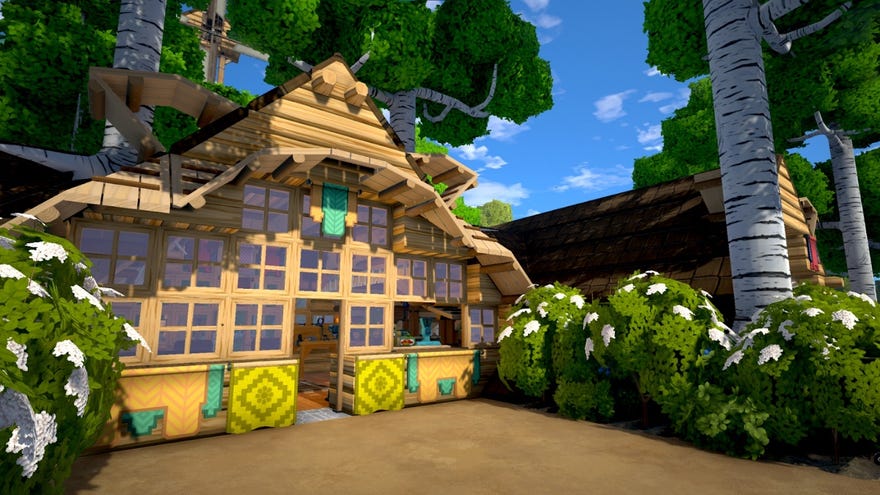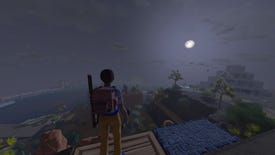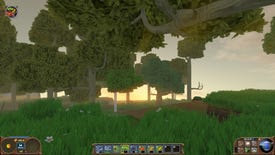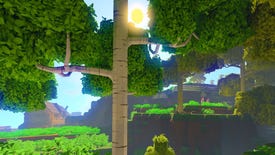Save-the-world sim Eco's 1.0 plans include oil spills, garbage collection and a bustling art scene
Developer Strange Loop Games details the roadmap out of early access
Eco is a very ambitious, wildly reactive multiplayer survival game in which you try to save the world without accidentally destroying it. There's a meteor scheduled to slamdunk the planet in 30 days, and in that time, you and your fellow players must progress from raising log cabins in the woods to building the means to develop technologies that might somehow avert the apocalypse. The trouble is, pioneering said apocalypse-averting technologies might itself bring about disaster in a gameworld that simulates things like habitat death, species extinction, air pollution and catastrophic flooding.
Players must thus walk a careful line between resource exploitation and self-inflicted calamity by monitoring their impact on the overall simulation, founding the right kind of government, and passing laws or devising economies (including player-created currencies) that don't flip the ecosystem upside down. The Steam reviews teem with anecdotes about people waking up to find their oil wells underwater, and it sounds like things will only get knottier when Eco releases out of early access around the end of this year.
The associated developer roadmap is a fun mixture of the usual 1.0 plans for final polishing and various enthusiastic descriptions of how they're going to make life worse for would-be meteor-survivors. On the one hand, you can expect more fleshed-out player professions "with lots more options to choose from and paths to take within those skills, to create a greater spread of possible careers, thus creating more 'niches' for players to specialize in and become valuable members of their community". On the other hand, they're adding a degradation mechanic, partly with a view to ensuring that certain vocations don't run out of things to do. "Everything will wear down and, if not maintained, break over time," the post explains. "This creates a constant need on professions to supply parts and perform repairs on these objects, preventing professions from going obsolete when all the needed objects are produced."
Eco 1.0 will seek to avoid grinding by increasing the frequency by which ability upgrades or new tools and vehicles become available. "We will be analyzing every profession to ensure that upgrades in abilities become available frequently, which we believe will greatly reduce any feeling of grind." the post explains. "One example we intend to produce is explosives for mining, allowing much greater bulk collection of ore." It will also, however introduce the problem of garbage, with crafting producing litter that must be placed in bins which must be scooped up by bin-collectors, who might need to be appropriately recompensed for their labours according to a tax-funded public sector - assuming that's how you and the other players structure your society.
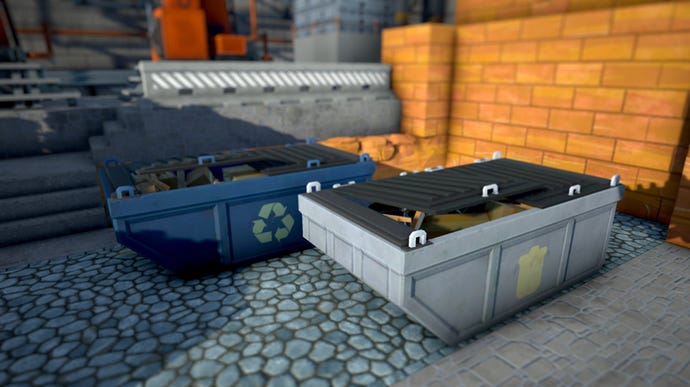
Eco 1.0 will introduce various features designed to cultivate "deeper 'emotions': representing the beauty of the natural and man-made worlds, taking care of animals, and general coziness that makes it very comfortable to spend time in". Take animal husbandry - the developer's "marquee launch feature", which will let you "raise animals for meat, milk, eggs, and wool, as well as pets, which will give a home bonus". (I'm not sure whether you can build factory farms, or whether the simulation will model the colossal emissions footprint of the animal agriculture industry, but these seem like logical if not very "cozy" extensions of the premise.)
The devs are also "adding a new scoring category for outdoor land, so that you can decorate your space beautifully and get rewarded for it, making for quaint and pretty villages", and are expanding the game's culture system, which let you score points for creative works. But alas and alack, all these feelgood objectives must be set against the desire "to add more end-game disasters and challenges beyond the meteor, challenges that will arise and face society over time."
Alice B had a crack at Eco back in 2018, and came away with interestingly mixed feelings. "Eco is good at showing how much impact we can have on our environment," she wrote. "It's just that it demonstrates it a bit too much, and the object of the game - cooperating with other players to balance saving the world with saving the world - feels like just as bleak an outcome as annihilation. I'd rather have been roasting a few tomatoes and cutting the grass on my dirt floor when it got too long, and welcoming the meteor."
Steve Hogarty reached similar conclusions in 2020. "Eco is commendable in its mission to thread ecological nuance and serious critical thought into the sandbox survival genre, but it does its job a little too efficiently, inadvertently simulating the protective layer of climate apathy in which we've cocooned our petrified little minds to avoid going absolutely insane on a near daily basis," he wrote. "The game's message is vital, but if working together to prevent the end of the world was any fun we'd already be doing it."
Good grief, what wonderful, optimistic people I work with! If you've been playing Eco and have happier stories to share of gameworlds that have successfully achieved utopia, I'd love to read them.
